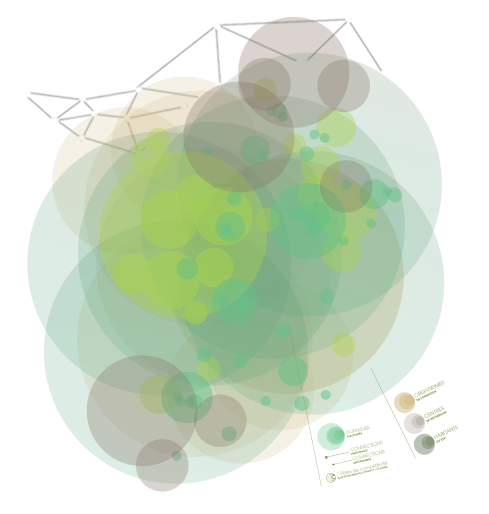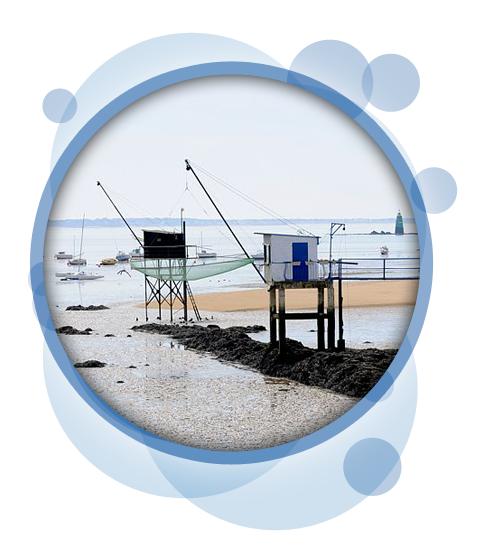



























An international callfor projects
As the fifth region in France, the Pays de la Loire is experiencing a powerful growth phase both demographically and socio-economically. Open to the world and concerned about the role it should play on a national level, it respects the human and economic balance in its territory and is sensitive to the impact of its actions on society. In order to consolidate this growth in a sustainable manner, our region is prioritizing development of the innovation landscape, research and higher education.
Tomorrow's development issues will depend on training more young people in our establishments, supporting excellence strategies by investing in flagship projects with an international profile, promoting the spread of innovative practices in our economic fabric, and stressing the efforts of our local authorities to support the development of higher education and research while mobilizing the resources of our enterprises.
Having learned from our solid experience in terms of hosting innovative and formative projects in the region and relying on a rich and mature ecosystem, it is now time for our region to welcome new projects and talents.
The region, the three main conurbations and the leading higher educational establishments have chosen to combine their skills and their know-how in order to identify breakthrough projects and support them during their maturation and integration phases.
« Connect talent » is the name of this ambitious programme that will thus enable our region to maintain its characteristic lead. It takes the form of an international call for projects, launched on 15 March 2013.

Which projectsfor our territory ?
By means of the international Connect Talent call for projects, the Pays de la Loire region and the experts in its ecosystem hope to detect breakthrough projects and support them to maturation.
Who is the call for projects aimed at ?
Talents
The call for projects is aimed at international scientific leaders working alone or with a team in order to kick start a new research programme or to accelerate the development of an existing programme.
Training
The call is open to educational establishments already present in the region and those from outside the region as long as they contribute ambitious development projects capable of providing the skills required by tomorrow's economy.
Research and technological development
The call for projects is open to large research facilities, private R&D centres and critically-sized laboratories both in France and internationally.
The ecosystemyou will be joining
Click the following buttons
to display the information

Structural materials
Advanced production
technologies
Learn moreDigital
Learn moreCivil
Engineering
Learn moreSocial
sciences
Learn moreBiotherapies,
médecine
régénérative
Learn moreEnergies
Regenerative
medicines
Learn moreVegetal
Learn moreFood
Nutrition
Learn moreSea
Learn more
Structural materials – Advanced production technologies
Research
10 leading national laboratories (5A+, 3A), 1300 people.
Powerful academic and industrial expertise in terms of materials, digital modelling and simulation of processes, composite and metal processing, robotics, virtual reality and non-destructive testing.
Industrie - Innovation
A "mechanics and materials" sector represents 40% of industrial employment in the region. The region is already French leader in the naval and water sports domain and occupies 2nd position in aeronautics (AIRBUS, AEROLIA, DAHER, BENETEAU, STX, DCNS, ALSTOM).
A highly structured "research and innovation" ecosystem, with the EMC2 competitive cluster, the EMC2 Technocampus and the Institut de Recherche Technologique Jules Verne, leading industrial research centres (EADS IW, FAURECIA) that support the development of a cutting-edge "composites" industry for aeronautics, naval construction, energy and land transport.
An ecosystem that presents a range of skills that is unique in France in terms of "advanced production technologies": design, integration and development of innovative processes for manufacturing complex parts and structures, developing and designing future factories. It is based on the complementary positioning of players and structures in technological research, collaborative R&D, SME/IET-oriented innovation, and high added-value technological transfers.
Digital
Research and training
A programme structured around the federations AtlanSTIC and Mathématiques des Pays de la Loire with a strong critical mass and an academic reputation in the fields of mathematics and information technology (decision, software, interaction), robotics and bio-IT. In terms of applications, the digital programme is particularly present in the region in the domain of health, the Internet of the future, advanced production technologies and the social sciences. It is supported by the CNRS and the Inria and is based on nationally-approved institutes of excellence: Labex CominLabs (IT) and Lebesgue (mathematics), IRT Jules Verne (the factory of the future) and B-Com (Internet of the future), Equipex Robotex (robotics).
Robotics is a field with great potential, developed by the IRCCyN laboratory that has expertise in production robotics, bio-inspired robotics, mobile robotics, humanoid robotics, on which expertise the Erasmus Mundus training in advanced robotics is based.
Innovation
The involvement of Digital players in the Images & Réseaux and EMC2 competitive hubs that led to the creation of the Jules Verne and B-Com IRTs testifies to their high degree of interaction with leading players in the telco, aeronautics and automobile sectors, and consolidates their skills and their potential for innovation. The development of creative and industrial industries is also an opportunity to develop digital creation and culture.
Moreover, the industrial fabric of the Pays de la Loire is characterized by a profusion of software companies, particularly in Web 2.0, free software and cloud computing, in interaction with a third sector that is very demanding in terms of large information systems and cloud computing.
The Clarté R&D platform on virtual reality deals with issues linked to computer-generated images, man-machine interactions and real-time multiprocessor IT.
The Electronics sector is also experiencing a boom: the West Electronic Network cluster lends added dynamism to the professional electronics sector numbering 25% of employment in French electronic industry, i.e 50 000 regional jobs.
Civil engineering
Research
The region relies on the support of a high concentration of national academic forces (nearly 25% of national research in the domain), focussing on complex infrastructures, studies of the sustainability of works, managing seismic risks and the effect of wind on constructions.
A research programme is developing around:
- The LiRGeC (Institut Ligérien de Research en Génie Civil et Construction) scientific interest group; CSTB Nantes; GeM, Ecole Centrale de Nantes, IFSTTAR, Université de Nantes Observatoire Nantais de l’Environnement Urbain. Employing about 500 people, leading national laboratories (GeM, CERMA…). A configuration that is unique in Europe.
- The IRSTV (Institute for research in city sciences and techniques): 170 researchers, engineers and technicians.
Industry - Innovation
Research is naturally oriented toward public buildings and the works sector (one of the three major sectors in the regional economy), transport, roads and bridges, particularly thanks to the presence of the Nova Build cluster that brings together contracting authorities, engineering and planning consultancies, manufacturers of materials, architects, certification bodies, etc.
With the support of Pôle EMC2, the Technocampus and the IRT Jules Verne, good connections between scientific players and the industrial world (aeronautics, transport, energy).
Social Sciences
Research
Nearly 950 researchers and teacher-researchers, fifty laboratories, 27 on a national level (2 A+; 25 A). 2 ERC Advanced Grant (agri-food law, development law, religious minorities in the Euro-Mediterranean space)
Acknowledged excellence in culture, heritage and tourism
- Regional collective programmes: NEOPAT; VALEUR
- The existence of very strong relations between societal Research and Innovation through many research and innovation programmes devoted to cities and heritage.
- A training dimension on an international level (2 masters A+)
Other programmes with regional and national visibility :
- « Otherness, identity, citizenship »
- « Sea and Shore »
- « Environment and territory »
- « Social links, collective actions and institutions »
An institute to receive international researchers in residence (institutes for advanced studies) and a regional structuring system ( (Maison des Sciences de l’Homme Ange Guépin).
Biotherapies - Regenerative medicine
Research
An excellent national reputation in the domain of regenerative medicine (10 units, 700 people) and internationally acknowledged expertise in biotherapies, nanomedicine, transplants, immunotherapy, cardiology, gene therapy, medical systems for reconstructing bones based on calcium phosphate (biomaterials), nuclear medicine.
A powerful structural dynamic with good international visibility:
- A significant increase in the workforce with the support of large organisations (INSERM, CNRS, INRA)
- The emergence of nationally-approved research centres and laboratories of excellence (LABEX IGO and IRON) and a University Hospital institute of excellence
- Several translational research programmes based on visible clinical platforms (2 Centres of Clinical Investigation, IbiSA-approved platforms, F‐CRIN, BioGenOuest)
- Teams that are highly involved in European or international programmes.
Industry - Innovation
High clinical appreciation: several tens of trials (phase I/II) at the Nantes and Angers sites.
Significant industrial appreciation with more than 20 academic and biotech spin-offs created in the last 15 years. The Atlanpole Biothérapies competitive cluster is driving this economic dynamic.
Renewable marine energy
Research
An increasingly dynamic programme with, new to the region, two factories and an Alstom engineering centre for constructing offshore wind turbines, combined with the involvement of STX for installing these turbines on the seabed.
An ongoing academic structure developing around the following aspects: mechanics/structural materials, civil engineering, energy, Hydrodynamics and Fluid-Structure Interaction, with the support of considerable experimental means gathered in the LHEAA (ocean engineering, traction, wind tunnels, engine test benches, etc.), some of them unique in Europe.
More broadly, more than 10 laboratories working on Energy and innovative equipment being developed, particularly :
- A 1000 m² technical platform for Energy, Thermal Energy, Associated Materials and Processes,
- A PREVER (Research and Studies on Residue-to-energy conversion) platform.
A deliberate strategy in the Region (financing major research programmes) and the ongoing establishment of CEA Tech is accelerating the structuring of regional expertise
- Electrochemical energy storage (lithium batteries, supercapacitors): Presence in the region (IMN) of a large team with international visibility for materials for electrochemical energy storage. Contributing to the RS2E network and the Labex STORE-EX
- Photovoltaics for the development of organic photovoltaic cells (Moltech’Anjou) and hybrid organic-inorganic cells (CEISAM)
- Sustainable management of nuclear waste (Subatech)
Vegetal
Excellent structuring of research and a strong INRA presence in the region, around a unique organisation, the SFR QUASAV (9 laboratories, 400 people) and training (Agrocampus Ouest, ESA, Université d'Angers). Recognised expertise in vegetal biology applied to seeds and horticulture (IRHS laboratory): selection, genetics, physiology, phytopathology and plant architecture, sustainability, resistance to tree diseases, seed pathologies, biology and physiology of seeds, biology of parasite plants, nutritional and taste qualities, developing plants and their metabolites, including in urban milieu (particularly green walls).
Powerfully emergent programmes :
- Genomics and epigenomics of perennial and pathogenic species
- Metagenomics of microbial communities associated with seeds
- Phenotyping, of seeds and interactions with pathogenic plants
Industry - Innovation
A considerable capacity for innovation and experimentation thanks to the presence of the Végépolys competitive hub with an international vocation and many installations (IbiSA platform, phenotyping platform) and the presence of the INRA experimental units.
Moreover, the programme is based on a dense industrial fabric constituted by the major seed manufacturers (CLAUSE, LIMAGRAIN, VILMORIN), horticulture and arboriculture companies.
Food nutrition
Research and training
A programme that covers a broad range of skills (production, transformation, consumption, with an original across-the-board programme for food quality and safety) with more than 20 laboratories, mobilising nearly 320 researchers. The powerful presence of the INRA and leading research units and equipment (BIA, GEPEA, IBiSA platforms).
Acknowledged skills on a national and international level for managing animal productions (epidemiology, risk analysis), biopolymer engineering and processes, food safety, food risk analysis, imprint of perinatal nutrition, sensometry, chemiometry.
A training offer structured around reference establishments: Agrocampus Ouest, ONIRIS, ESA. A nationally-approved (IDEFI) "Manimal" training excellence project for food safety co-supported by Oniris and the Nantes medical faculty.
Industry - Innovation
A strategic programme for the territory, in 2nd place on a national level for agriculture, animal and human nutrition and agro-equipment (more than 26,000 jobs).
Close links with the economic sphere maintained by competitive hubs and clusters Valorial, Végépolys, Nova Child, Cluster West and many supporting structures promoting research and innovation (PRI CAP ALIMENT, INRA Transfert, Instituts Carnot Santé Animale and Qualiment®, CTCPA, TECALIMAN).
Sea
A broad, transdisciplinary programme with strong links to renewable marine energy and naval programmes, comprising ten laboratories, 3 of which enjoy a national reputation with a global workforce of 500 people in the research federation Institut Universitaire Mer et Littoral. Acknowledged skills in marine biotechnologies, microalgae and marine micro-organisms.
Powerful regional positioning in marine industries: the naval sector with a focus on developing the ships of the future, developing renewable marine energy (particularly offshore wind energy). Alongside important economic players, innovation dynamics are ongoing (IRT Jules Verne, development of DCNS, installation of the CEA).
Acknowledged skills in marine biotechnologies and microalgae and marine micro-organisms, with good structural dynamics thanks to international-level projects: Greenstars, DéfiμALG, IFREMER institute for micro-algae (IMA), AlgaeBiomic (AMI ADEME)...

What breakthroughsfor the future ?
The Pays de la Loire hopes to receive breakthrough projects in response to the international call. A breakthrough project is one that has the aim and potential to meet one or more of the major scientific or technological challenges of our time, inside one discipline or in a transdisciplinary logic, a project capable of meeting one or several challenges in the field of training, an innovative project whose societal and economic impacts in the medium and long term are incontestable, an audacious project capable of significantly accelerating the current driving forces in our region and winning it scientific and academic recognition, and a reputation and attractiveness on a worldwide level.
Criterion n°1
Quality and ambition
The academic quality of the project and the scope of the issues identified on the scientific, industrial and human level.
The ambition of the project, on a scientific, technological and innovative level, to develop new pathways and fields for training.
Criterion n°2
Added value
and impacts
The degree to which the project is consistent with the themes and programmes of the regional ecosystem and the ongoing structural projects and dynamics.
Its development potential in terms of cooperating with the academic and industrial structures in the region.
The ripple effect and the expected impacts of your project on the academic level, on the dynamics of innovation, on the human and economic level.
Criterion n°3
Feasibility
The economic scale of the project: first estimation of the cost of operation, public support systems and financing both envisaged and envisageable.
The feasibility of the project: its general organization, human and technical resources, necessary partnerships, governance and evaluation of impact.
Our Commitmentsalongside you
Personalized support in the different maturation phases of your project (from the feasibility study to the financing plan) with a dedicated contact, a reference on one of the component parts of the ecosystem.
Access to all in the "research, innovation, training" ecosystem, to all its support functions and resources.
A guarantee that your project will immediately be included in a medium and long term strategy.
A guarantee that you will quickly benefit from the human and technical means to help you implement your project.
A guarantee of autonomy in implementing your project in the short, medium and long term.
Great proximity to help you implement your personal life project or that of your teams (installing families, spouses, children).

- Technocampus,
Nantes,
where industry
meets researchLearn more about Technocampus, - Eurofins,
Nantes
Learn more about Eurofins, - The Arronax Cyclotron,
(Nantes, Saint Herblain)
Particle Accelerator for
Research in Radiochemistry
and OncologyLearn more about The Arronax Cyclotron, - Vivalis,
Saint Herblain
Learn more about Vivalis,
Success storieswe have already supported
Click the following buttons
to display the success stories.
Technocampus, Nantes, where industry meets research
This brings together in the same place the composite materials industry for the region, public and private research institutes and higher education establishments in order to develop innovation and to supply the whole territory by pooling means and sharing technological progress :
- A broad chain of mobilizable skills ranging from fundamental research to pre-industrialization
- Services: consulting, support, training, technological services, from product design to manufacture
- Pooled technological means, resources and equipment localized on the same 19,000 m² site
Thanks to a total investment (private and public) of nearly €80M and the support of the region in mobilizing and organizing the research community, catalyzing financing by local authorities and organizing the round table session, helping property development for projects, assisting the development strategy for projects, Technocampus is now, after 3 years of existence: 18 installed companies, €6.6M invested in equipment and R&D, a €12M R&D budget, 235 jobs, 600 visitors, 35 ongoing collaborative projects, and 700 hours of training provided.
Eurofins, Nantes
With a portfolio of more than 100,000 analytical methods and more than 80 million parameters analyzed per year, Eurofins is the world leader in bio-analytical services for the agribusiness and pharmaceutical products markets.
It is also world leader in laboratory environmental analysis services.
It developed out of a Université de Nantes laboratory in 1987 and, with the support of the region, Eurofins has grown in 20 years from being a start-up with 12 employees to being a world group comprising 170 laboratories that employs 13,000 people in Europe, the United States, Asia and South America.
The Arronax Cyclotron, Particle Accelerator for Research in Radiochemistry
and Oncology (Nantes, Saint Herblain)
The result of a joint initiative by the Subatech laboratory (CNRS, the Nantes Ecole des Mines, Université de Nantes) and the Centre Régional de Recherche en Cancérologie in Nantes (Inserm, Université de Nantes), this giant facility is installed just outside Nantes on the campus of the CHU and the Centre de Lutte Contre le Cancer.
Set in motion in autumn 2010, its mission is to produce innovative radioisotopes for medical research and for nuclear chemistry research and radiolysis.
Investments of nearly €40M (the Pays de la Loire region, local authorities, the state and Europe) have enabled it to structure this reference facility in nuclear medicine, currently comprising 6 academic members, a team of 25 people with multiple skills (physicists, radiochemists, biologists, engineers, technicians and managers) with an annual operating budget in the region of €2M.
Vivalis, Saint Herblain
The result in 1996 of the association of the Groupe Grimaud (Nantes) and a team of INRA-CNRS-ENS Lyon scientists, Vivalis was created in 1999 following acquisition of exclusive rights for patents covering techniques for isolating and cultivating embryonic avian stem cells.
After a little more than 10 years of development, with the support of local authorities and academic partners, Vivalis is now world leader for the development and commercialization of the EB66® technology (all the cell lines derived from chicken and duck embryonic stem cells) for manufacturing viral vaccines and protecting therapeutic proteins and monodonal antibodies (30+ research and commercial licences for the EB66® technology have already been awarded to pharmaceutical and biotechnology companies) and developing and commercializing the VIVAIScreen ™ technology for discovering new human monodonal antibodies.










